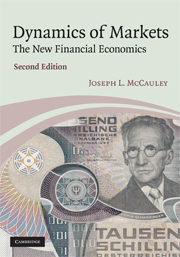Book contents
- Frontmatter
- Contents
- Preface to the second edition
- 1 Econophysics: why and what
- 2 Neo-classical economic theory
- 3 Probability and stochastic processes
- 4 Introduction to financial economics
- 5 Introduction to portfolio selection theory
- 6 Scaling, pair correlations, and conditional densities
- 7 Statistical ensembles: deducing dynamics from time series
- 8 Martingale option pricing
- 9 FX market globalization: evolution of the Dollar to worldwide reserve currency
- 10 Macroeconomics and econometrics: regression models vs empirically based modeling
- 11 Complexity
- References
- Index
11 - Complexity
Published online by Cambridge University Press: 02 December 2010
- Frontmatter
- Contents
- Preface to the second edition
- 1 Econophysics: why and what
- 2 Neo-classical economic theory
- 3 Probability and stochastic processes
- 4 Introduction to financial economics
- 5 Introduction to portfolio selection theory
- 6 Scaling, pair correlations, and conditional densities
- 7 Statistical ensembles: deducing dynamics from time series
- 8 Martingale option pricing
- 9 FX market globalization: evolution of the Dollar to worldwide reserve currency
- 10 Macroeconomics and econometrics: regression models vs empirically based modeling
- 11 Complexity
- References
- Index
Summary
Reductionism and holism
It was a fad in certain circles in the 1990s to announce that “reductionism is dead,” and that holism is necessary in order to understand biology and social systems. To discuss this we must first define the terms (The American Heritage Dictionary).
Holism is a theory or belief emphasizing the importance of the whole and the interdependence of its parts. In classical mechanics, for example, we understand the solar system in terms of its parts (the sun and the planets), and the interactions (“relationships”) are nonlinear. In quantum mechanics we understand complicated molecules like DNA in terms of the binding of smaller molecules. The genetic code is understood in terms of its building blocks: the four letter (computer) alphabet constructed from the bases A, C, G, and T. One understands the bases in terms of simpler molecules, the molecules in terms of atoms, and the atoms in terms of electrons and nuclei. This is reductionism: everything can be understood to be constructed systematically from electrons and positively charged nuclei. Yet, there is something that we cannot calculate from first principles using quantum mechanics: the behavior or the genes as a classical computer with three-letter words constructed from a four-letter alphabet. Quantum theory is linear, and the phase coherence cannot be destroyed from within, meaning that classical behavior cannot be derived from quantum theory without introducing a nonquantum assumption of destruction of phase coherence. This leads into the famous measurement problem clarified by von Neumann.
- Type
- Chapter
- Information
- Dynamics of MarketsThe New Financial Economics, pp. 241 - 260Publisher: Cambridge University PressPrint publication year: 2009



